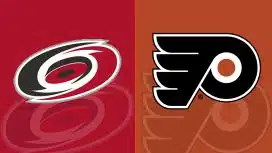By Kevin Durso, Sports Talk Philly editor
The Broad Street Bullies were five years removed from their second consecutive Stanley Cup title and had made another appearance in 1976 in the Final, so they were still among the class of the NHL in 1980.
Earlier in the season, the Flyers had pulled off a record-setting unbeaten streak of 35 games, something that is still unmatched to this day. The Flyers swept their way through the Edmonton Oilers in three games, then defeated the Rangers in five games and the Minnesota North Stars in five games to cruise into the Stanley Cup Final with an 11-2 record.
The team meeting them in the Final was the New York Islanders, who had defeated the Los Angeles Kings in four games, the Boston Bruins in five games and the Buffalo Sabres in six games to reach the Stanley Cup Final for the first time in their franchise history. Little did anyone know at the time that Al Arbour’s Islanders were about to embark on a four-year run that would turn them into a dynasty. But the first of four straight Cups for the Islanders didn’t come without a little controversy.
Here is a look back at the 1980 Stanley Cup Final between the Flyers and Islanders.
Game 1: Islanders 4, Flyers 3 (F/OT)
The Flyers opened the scoring in the series at 10:31 of the first period when Mel Bridgman scored after a turnover behind the net by Islanders netminder Billy Smith. The Islanders evened things up with a power-play goal by Mike Bossy.
Early in the second at 2:20, Denis Potvin scored from the slot after a set-up from Clark Gillies to make it 2-1 Islanders. The Flyers matched the goal at 17:08 of the second with Bobby Clarke scoring with a deflection on the power play.
Into the late stages of the third, the Flyers grabbed the lead when Rick MacLeish threw a shot from the side of the net that beat Smith to make it 3-2 with 6:50 remaining. But that’s when two late penalties did the Flyers in.
Al Hill took a hooking penalty with 5:25 to play and the Islanders tied the game on the power play with Stefan Persson scoring off a feed from Bossy with 3:42 remaining. That forced overtime and 2:08 into sudden death, Jimmy Watson took a holding penalty. With just one second remaining on the power play at 4:07, Potvin scored his second goal of the game with a one-timer to win Game 1 for the Islanders.
Game 2: Flyers 8, Islanders 3
The Islanders got off to a hot start in Game 2 with a goal from Butch Goring at 3:23 of the first period, but the Flyers had a response with three goals in the period. Paul Holmgren scored on the power play at 7:22 and Bob Kelly added a goal just 1:15 later to make it 2-1. Clarke finished off the scoring in the period with a goal at 17:23 to make it 3-1 Flyers.
Just 1:06 into the second period, Bill Barber scored to make it 4-1 Flyers and put them in control. While the Islanders got back into the game with a power-play goal by Bryan Trottier, Holmgren’s second power-play goal of the game restored the three-goal lead just 45 seconds later. At 15:47 of the period, Brian Propp scored on the power play to make it 6-2.
The Flyers poured it on early in the third to seal the result. Tom Gorence scored at 1:40 of the period and Holmgren finished off a hat trick at 4:19 to make it 8-2. The Islanders got a late power-play goal from Goring with five minutes remaining to cap the scoring in the 8-3 decision for the Flyers.
Game 3: Islanders 6, Flyers 2
With the series going back to Long Island, it was all Islanders in Game 3. Lorne Henning scored a shorthanded goal at 2:38 to open the scoring and the Islanders added three power-play goals in the remainder of the period from Potvin, Trottier and Bossy to take a 4-0 lead.
Late in the second period, two more power-play goals made it 6-0 Islanders as Gillies got on the board and Potvin added his second of the game.
Clarke and Mike Busniuk scored for the Flyers in the third to get them on the board, but the Islanders convincingly took Game 3 by a score of 6-2.
Game 4: Islanders 5, Flyers 2
The Islanders got off to a similar start in Game 4, jumping out to a 2-0 first-period lead. Bossy scored on the power play at 7:23 and Goring added a goal at 13:06 to put the Islanders ahead.
The Flyers got the only goal of the second period when John Paddock scored at 1:35 to cut the lead to one. The Flyers were unable to take advantage of three power plays in the second to tie the game. The Islanders got the next goal at 6:06 of the third when Trottier scored to pad the lead. Linseman scored at 11:53 to cut the lead back to one, but the Islanders pulled away from there. Nystrom scored just 42 seconds later and Gillies added another goal at 14:08 to cap the scoring in the 5-2 decision.
Game 5: Flyers 6, Islanders 3
The series went back to Philadelphia with the Flyers needing a win to keep the series alive. But it was the Islanders that got on the board first with Persson scoring a power-play goal at 10:58.
The Flyers rallied early in the second to tie the game with Clarke scoring at 1:45, then took the lead on a MacLeish goal at 5:55. Trottier tied it up with 3:44 remaining in the second, but Busniuk gave the Flyers the lead back just 48 seconds later.
MacLeish added a second goal at 9:43 of the third to make it 4-2. Propp scored on a power play at 12:33 to extend the lead to three and put the Flyers in control. While the Islanders got another power-play goal from Persson with 5:03 to play to cut the lead back to two, Holmgren scored with 2:34 remaining to cap the scoring in the 6-3 Flyers win and force the series back to Long Island.
Game 6: Islanders 5, Flyers 4 (F/OT)
It is a game that lives in Flyers lore as one of the most controversial and frustrating of all time.
A back-and-forth first period featured two goals for each side. Reggie Leach scored on the power play at 7:21 to give the Flyers the lead, but Potvin responded with a power-play goal at 11:56 to tie the game.
Then Duane Sutter scored at 14:08 of the period that will be talked about forever. The Islanders made a great passing play with Gillies dropping a pass for Goring who centered for Sutter for the goal. But Gillies drop-pass to Goring exited the zone and should have been whistled as offside by linesman Leon Stickle. Instead, the play continued, Sutter scored and the goal counted to give the Islanders a 2-1 lead.
Late in the period, the Flyers tied the game with a goal by Propp with 1:02 remaining in the period.
The Islanders regained control in the second with a pair of goals. Bossy scored on the power play at 7:34 and Nystrom added an insurance goal with 14 seconds left in the period to make it 4-2.
But the Flyers again rallied, getting a goal from Bob Dailey at 1:47 and the tying goal from Paddock at 6:02 to even things up at four with the offside goal looming large.
The game went to overtime, and the Islanders eventually claimed the game and the series. Henning led a pass ahead to John Tonelli. Tonelli was able to move around Dailey, creating a two-on-one and got the pass across to Nystrom for the tip-in goal to win the game and the Stanley Cup.
Full highlights from the series can be seen below:
Looking back at this series, it’s really a who’s who of two great expansion teams. The Islanders were just starting on a four-year dynasty that featured a number of Hall of Famers including Bossy, Potvin, Trottier, Gillies, head coach Al Arbour and general manager Bill Torrey. On the Flyers side, there were legends like Clarke and Barber, both Hockey Hall of Famers, as well as franchise legends like MacLeish and Leach. Add in that Holmgren, Linseman and Propp were in the very early stages of their careers and this was a team poised for more great things over the years and it wasn’t that long after that the franchise was back in the Stanley Cup Final.
Those future Hall of Famers for the Islanders were excellent throughout the series. Bossy had four goals and 11 points in the series. Potvin had five goals and nine points. Trottier, who won the Conn Smythe Trophy, had four goals and eight points. Gillies also had eight points. Add in Persson, who had seven points, along with Goring (six points) and Game 6 hero Nystrom (four points) and you can see the depth this team had. Seven different Islanders had at least two goals in the series.
If anything, this is a thought of what could have been. The Flyers had been the best team in the NHL all season, paced by that unmatched unbeaten streak. You think of the late Game 1 rally on the power play by the Islanders that gave them the edge and the infamous blown call in Game 6 and that right there could have been the two wins that would have shifted the series in Philadelphia’s favor. There’s also no way of knowing what would have happened if Game 7 were to come back to Philadelphia and had been played assuming the offside goal never happened.
Of course, the game at that time could not correct the human error that was always a possibility with the officials. The Flyers had also run into an incredibly talented team that was soon to become legendary. This was only the beginning for the Islanders, and they won their next three Stanley Cups more handily than in this series against the Flyers, which was very close to going the distance with a Game 7.
Next week, we will wrap up our Series in Review with two more series that are defining to the Flyers franchise history. On Monday, we will look back at the 1975 Stanley Cup Final. On Tuesday, we will complete the series with a look at the 1974 Stanley Cup Final.







